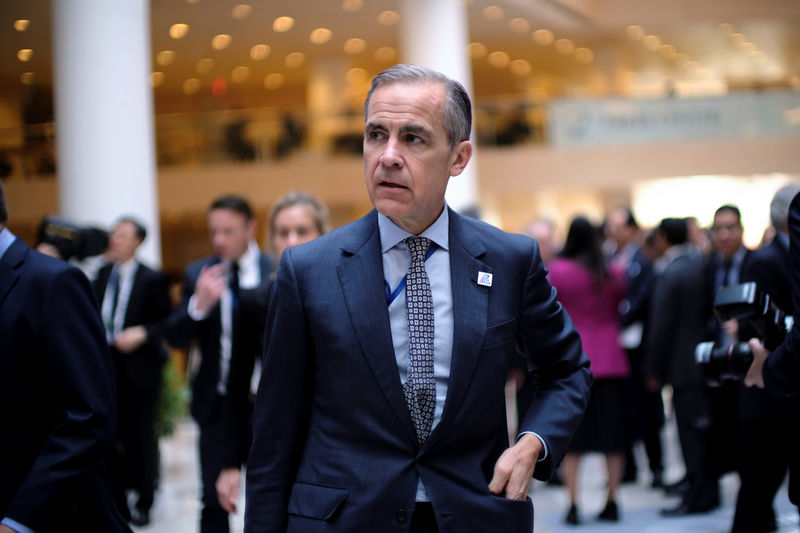LONDON (Reuters) - Britain is starting its search for a new governor of the Bank of England to succeed Mark Carney who is due to step down in January 2020.
Carney has twice extended his term in charge of the British central bank in order to help guide the economy through Brexit.
But he has ruled out a further delay even though Britain's departure from the European Union remains up in the air.
Finance minister Philip Hammond is hoping that concerns about Brexit will not deter potential applicants.
Following is a summary of possible contenders to run the BoE which oversees the world's fifth-biggest economy and Britain's huge finance industry.
ANDREW BAILEY
A former deputy BoE governor, Bailey was tipped by analysts as Carney's most likely successor. But the delays to the search for the next BoE governor has raised questions about whether finance minister Philip Hammond sees him as the best candidate.
Bailey reached the role of deputy governor at the BoE with a focus on banks before becoming chief executive of the Financial Conduct Authority, a financial markets regulator.
In his time at the BoE, Bailey helped to steer Britain's banks through the global financial crisis, enhancing his reputation as a safe pair of hands.
But heading the FCA is fraught with risks. Lawmakers in parliament's Treasury Committee criticized Bailey for not publishing all of a report into alleged misconduct by bank RBS (LON:RBS). Bailey has cited privacy restrictions.
As FCA boss, Bailey sits on important panels at the BoE that oversee banks. Although he has never been interest-rate setter, he once ran the BoE international economic analysis team.
BEN BROADBENT AND DAVE RAMSDEN
Broadbent and Ramsden are deputy governors for monetary policy and for markets and banking respectively.
Broadbent, a former Goldman Sachs (NYSE:GS) economist who trained as a classical pianist, is respected for his economic analysis but has less experience on banking oversight.
Ramsden was the Treasury's chief economic advisor before joining the BoE.
The two other BoE deputy governors, Jon Cunliffe and Sam Woods, are less likely contenders. Woods focuses mostly on financial regulation while Cunliffe - a former British ambassador to the European Union - would be aged 66 at the start of the term which usually runs for eight years.
ANDY HALDANE
The BoE's chief economist, Haldane has developed a reputation for floating unconventional ideas, including the possibility that music apps such as Spotify and multiplayer online games might give central bankers just as a good a sense of what is going on in the economy as traditional surveys. In 2012, he praised the anti-capitalist Occupy movement for suggesting new ways to fix the shortcomings of global finance. Haldane has experience of both sides of the BoE, having served as executive director for financial stability, overseeing the risks to the economy from the banking system. But he might be seen as too much of a maverick to take the job of governor.
OUTSIDERS?
The announcement of Carney, the first non-British governor of the BoE in more than three centuries, was a surprise.
But his tenure has been seen as a success for financial diplomacy, and the government is keen to promote what it calls a "global Britain" after the country leaves the European Union.
RAGHURAM RAJAN
Rajan, 56, was governor of the Reserve Bank of India from 2013 to 2016, and chief economist at the International Monetary Fund between 2003 and 2006, when he warned that financial innovation could trigger a crisis.
Now a finance professor at Chicago Booth business school, Rajan has just published a book on populist dissatisfaction with markets and the state - touching on some of the underlying issues that drove the Brexit vote in 2016.
Rajan unexpectedly did not seek a renewal of his three-year term at the RBI, having faced hostility from some sections of Prime Minister Narendra Modi's BJP party who disliked his less nationalist stance and brief forays into political territory.
Rajan declined to comment when asked by Reuters last week whether he would consider a return to active policymaking.
A LABOUR PARTY GOVERNOR?
The prospect of the left-wing Labour Party taking power has grown as Prime Minister Theresa May struggles to break the Brexit impasse in parliament.
Labour leader Jeremy Corbyn and his would-be finance minister John McDonnell are socialists and have in the past proposed that the BoE should fund investment in infrastructure, a big change from its current focus on inflation.
Former members of Labour's economic advisory committee included U.S. academic and Nobel Prize winner Joseph Stiglitz and Ann Pettifor, a British economist who is an austerity critic and former BoE rate-setter David Blanchflower.
